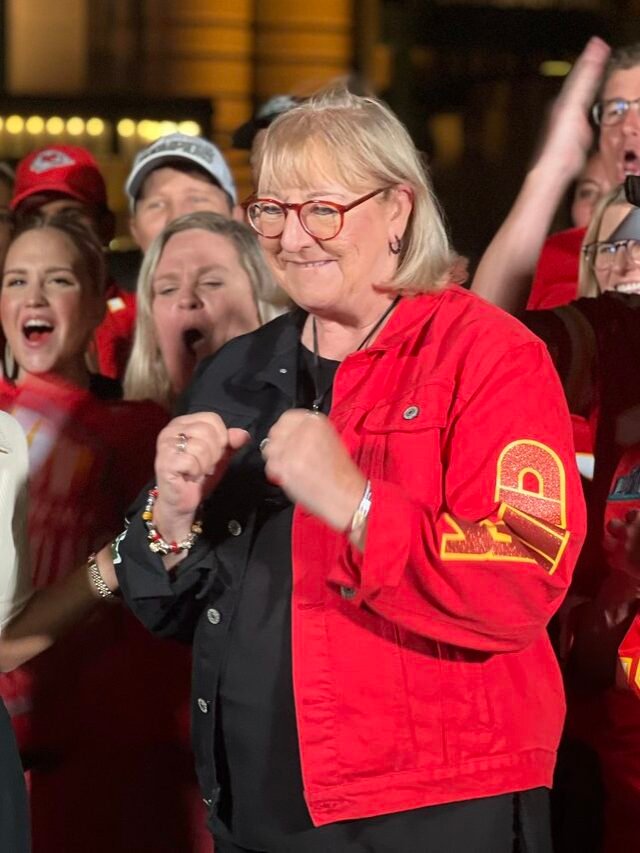Is Travis Kelce truly apolitical, or does he lean towards a specific side of the political spectrum? The question has been on the minds of many fans following his recent social media activities. A bold statement from the NFL star during the aftermath of the 2024 presidential election stirred up discussions and debates among his followers. His post-election message was not just about congratulating the winners but also included a call for unity and respect among all citizens, regardless of their political affiliations.
Travis Kelce, the prominent tight end for the Kansas City Chiefs, has always maintained an air of neutrality when it comes to politics. However, this stance hasn't stopped conspiracy theories from emerging, especially with his rumored relationship with Taylor Swift, who is known for her vocal support of the Democratic Party. The timing of his posts often sparks conversations about his true political beliefs. In one instance, a conspiracy theory linked him to Swift's political activities, suggesting that his silence might be strategic rather than genuine. Yet, Kelce himself has clarified that he prefers staying out of political controversies to focus on his career and personal life.
| Name | Travis Kelce |
|---|---|
| Date of Birth | November 5, 1989 |
| Place of Birth | Cincinnati, Ohio, United States |
| Height | 6 ft 5 in (196 cm) |
| Weight | 260 lbs (118 kg) |
| Position | Tight End |
| Team | Kansas City Chiefs |
| College | Cincinnati Bearcats |
| Drafted | 2013 / Round: 3 / Pick: 73 |
| Notable Awards | Seven-time Pro Bowl Selection (2016–2022), Four-time First-Team All-Pro (2016, 2018–2020) |
| Family | Mother: Donna Kelce (Democrat); Sister: Kylie Kelce; Brother: Jason Kelce (Philadelphia Eagles) |
| Political Views | Neutral, encourages voting without endorsing any party |
| Reference | NFL Player Profile |
Beyond Travis Kelce's own actions, the political views of his family members have also come under scrutiny. His mother, Donna Kelce, is a well-known Democrat and has been active in advocating for various policies within the party. Her influence is evident in some of the values instilled in her children, though each sibling has chosen their own path regarding public expression of political beliefs. For instance, Kylie Kelce, Travis’s sister, recently opened up about her left-leaning politics after gaining prominence through her podcast Not Gonna Lie. She explained that she waited to express these views due to concerns over backlash but now feels empowered to speak truthfully.
The involvement of other family members in political discussions adds layers to the narrative surrounding the Kelces. Jason Kelce, Travis’s brother and former Philadelphia Eagles center, has occasionally shared his thoughts on current events but remains cautious about aligning too closely with any single party. This approach reflects the broader strategy adopted by the family—to engage meaningfully in civic discourse while avoiding divisive rhetoric.
In contrast, Travis continues to emphasize the importance of individual responsibility in shaping the nation's future. He frequently encourages fans to exercise their right to vote, irrespective of which candidate they support. Such messages highlight his commitment to fostering dialogue rather than taking sides, even as external pressures mount for celebrities to declare their allegiances more explicitly.
Another notable aspect of this story involves the dynamics between Taylor Swift and Brittany Mahomes, both of whom attended a recent Kansas City Chiefs game. While Swift sat alongside Donna Kelce, Mahomes chose a separate suite, possibly reflecting ongoing tensions tied to differing public perceptions of their political associations. Patrick Mahomes, Brittany's husband and quarterback for the Chiefs, has largely avoided commenting on political matters, maintaining a similar stance to Travis Kelce.
This interplay between sports, entertainment, and politics underscores how deeply intertwined these spheres have become in modern society. As athletes and artists gain platforms that allow them to influence millions, expectations around their roles as public figures evolve. Some choose to leverage their visibility to advocate for change, while others prioritize neutrality to preserve their appeal across diverse audiences.
For Travis Kelce, navigating this landscape requires balancing authenticity with discretion. By focusing on uniting people through sport and encouraging civic engagement without prescribing solutions, he aims to inspire positive action without alienating anyone. His approach serves as a reminder that leadership isn't solely defined by outspokenness—it can also manifest through thoughtful restraint and inclusive messaging.
As the conversation around celebrity activism continues to grow, individuals like Travis Kelce demonstrate the complexities involved in managing personal identities amidst heightened scrutiny. Whether choosing to remain neutral or embracing advocacy, every decision carries weight in today's hyper-connected world. Ultimately, the choices made by influential figures shape not only their legacies but also the cultural narratives we collectively construct.
Returning to the original query about Kelce's political alignment, it becomes clear that labeling him as either liberal or conservative oversimplifies the situation. Instead, his dedication to promoting dialogue and participation highlights a nuanced perspective shaped by familial influences, professional experiences, and personal convictions. Moving forward, understanding such intricacies will prove essential in evaluating the evolving role of sports personalities in broader societal contexts.



